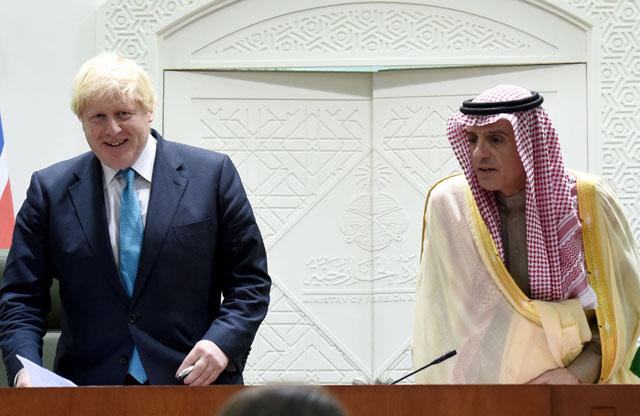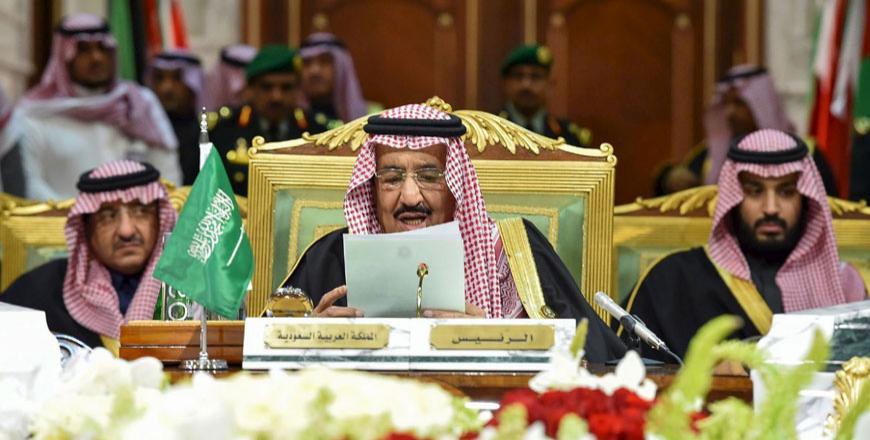You are here
Britain’s May says to help Gulf leaders ‘push back’ Iran
By AFP - Dec 07,2016 - Last updated at Dec 07,2016
DUBAI — Prime Minister Theresa May told Gulf leaders on Wednesday that Britain would help "push back" against Iranian aggression as they agreed on a strategic partnership to deepen ties.
Addressing a summit of the six-nation Gulf Cooperation Council (GCC) in Bahrain, May reaffirmed British support for traditional allies in the region, while also seeking to strengthen post-Brexit trade.
"I want to assure you that I am clear-eyed about the threat that Iran poses to the Gulf and to the wider Middle East," she told leaders of the GCC, which brings together Saudi Arabia, Bahrain, Kuwait, Oman, Qatar and the United Arab Emirates.
The mainly Sunni Arab Gulf monarchies and Shiite Iran are bitter regional rivals, at odds over a range of issues including the wars in Syria and Yemen.
GCC countries are concerned about Iran's growing influence in the region, especially after last year's nuclear deal between Tehran and world powers took a step towards ending its international isolation.
The Iran agreement was "vitally important for regional security", May told the summit.
"But we must also work together to push back against Iran's aggressive regional actions."
In a joint statement after the summit, Britain and the GCC agreed to a “strategic partnership” that would foster “political, defence, security and trade” ties, while “developing collective approaches to regional issues”.
In their statement, GCC states and Britain said they “oppose and will work together to counter Iran’s destabilising activities”.
As part of strengthening military cooperation, Britain will maintain a presence “throughout the Gulf,” the statement said, including through British defence staff to be based in Dubai.
The statement said Britain and GCC countries were “committed to continue working towards a sustainable political resolution in Syria”, where President Bashar Assad “has lost all legitimacy and has no role in Syria’s future”.
May ‘ambitious’ on trade
It called for Assad’s backers including Russia and Iran “to support a meaningful end to the violence, sustained humanitarian access and an inclusive political process” in Syria.
During her speech, May said the two sides would study liberalising trade as Britain prepares to leave the European Union after the shock referendum vote to quit the bloc.
“I want these talks... to pave the way for an ambitious trade arrangement” after Brexit, she said in Bahrain, which was a British protectorate for 100 years and gained full independence in 1971.
May was the first woman and first British leader to address a GCC summit, as Gulf countries deepen ties with major powers beyond longtime ally the United States.
In May last year, France’s President Francois Hollande became the first Western head of state to attend a GCC summit.
US President Barack Obama followed in April this year, seeking to reassure Gulf monarchs about US overtures to Iran.
GCC leaders have expressed concern over the international agreement that lifted sanctions on Iran this year in exchange for guarantees it would not pursue a nuclear weapons capability.
Riyadh and its allies fear the pact will lead to more Iranian intervention in a region which, they feel, has suffered from a lack of American involvement under Obama.
The EU including Britain is the Gulf’s biggest trading partner, with trade flows of more than 130 billion euros ($140 billion) annually.
But almost 30 years after the Gulf states and EU began talks on free trade, still no deal has been reached.
Bilateral trade between Britain and the GCC was worth more than 30 billion pounds ($38 billion) last year.
Related Articles
TEHRAN — Iran summoned the British ambassador Saturday to protest against “interference” by Prime Minister Theresa May after she told Gulf l
RIYADH — The press took out of context comments by Britain’s foreign secretary about “proxy wars” waged by longtime ally Saudi Arabia, the S
Gulf Arab states called on Thursday for an international reconstruction conference for Yemen after any peace deal to end the country's civil


















